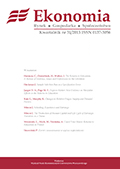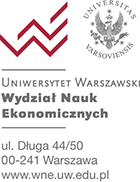Numer wydania: 42
W numerze:
Was It All Worth It? On the Value of Tertiary Education for Generation ’77 in Poland
L. Wincenciak
ABSTRAKT |
PDF
This research paper aims at estimating the value of tertiary education in Poland for men and women over the life cycle using specific dataset of Labor Force Surveys for generation born in 1977. Regression-adjusted counterfactual wages are estimated using Heckman selection models as proxy of the alternative costs of studying and a special Discrete Choice Experiment is designed to evaluate the value of time devoted for studying as a proxy of effort required to complete the studies. Results suggest that the net present value of tertiary education is lower for men than women in the short horizon of professional career. The surprising effect is that the internal rate of return appears to be slightly higher for women.
She Cares and He Earns? The Family Gap in Poland
E. Cukrowska-Torzewska
ABSTRAKT |
PDF
This paper deals with parenthood induced inequalities in the labour market outcomes of men and women in Poland. It extends the existing framework of research by providing a joint analysis of parenthood impact on working hours and wages for men and women for a transition economy. Using propensity score matching and fixed effects estimation this paper reveals that parenthood is associated with longer working hours and greater wages for men and shorter working hours and lower wages for women. The gaps in working hours may be however partially attributed to unobserved differences between parents and childless individuals. For men, unobserved heterogeneity also explains their greater wages. Mothers are however found to receive significantly lower wages even if their unobserved characteristics and self-selection into employment are accounted for.
Corruption and Export Performance in Post-communist Countries: Evidence from Firm-level Data
A. Cieślik, Ł. Goczek
ABSTRAKT |
PDF
In this paper we investigate the empirical relationship between corruption and export performance of firms in 30 post-communist countries. Our analytical framework refers to the recent strand in the new trade theory literature based on the Melitz (2003) model that stresses the importance of firm productivity and trade costs in entering the export markets. The empirical implementation of the theoretical framework is based on the fractional logit model and the IV–V BEEPS dataset covering the period 2008?2014. Our empirical results for over 20 thousand surveyed companies confirm the negative and statistically significant relationship between corruption and export performance in post-communist countries.
Quality of Institutions for Global Knowledge-based Economy and Convergence Process in the European Union
A. Balcerzak, M. Pietrzak
ABSTRAKT |
PDF
The use of the potential of economic convergence is one of the key challenges of economic policy in the case of the European Union. Due to structural changes that have led to the growing role of knowledgebased economy (KBE), the analysis made in the paper is based on the assumption that the convergence process of the EU countries takes place in the reality of the KBE, thus in order to facilitate it, all the EU members should concentrate on building institutions that are adequate to the conditions of the KBE. In this context, the aim of the study is to verify the potential impact of the quality of institutional system of the EU countries on the convergence process. In this regard, the analytical framework of conditional ß-convergence was used with econometric dynamic panel modeling. To measure the quality of institutional system the authors proposed an indicator, designed with TOPSIS method. For this purpose the data were obtained from the Fraser Institute database. Dynamic panel econometric analysis carried out for the European Union countries in the years 2004–2010 confirms that the high quality and adequacy of the institutional system to the conditions of the KBE supports convergence process in the EU.
Determinants of Corruption in Ukrainian Regions: Spatial Analysis
A. Penska
ABSTRAKT |
PDF
This study investigates the determinants of corruption in Ukrainian regions and applies spatial analysis to examine the relationship between corruption perception index and economic, political and cultural factors. The results of the study show that economic growth decreases corruption in the regions. The paper also challenges the existing academic studies, as it shows positive impact of the number of civil organizations in Ukrainian regions on corruption. The implications of the empirical research are, therefore, a valuable asset to the existing literature on corruption. They indicate that dealing with corruption in Ukraine requires consideration of the influence of regionspecific corruption determinants.

